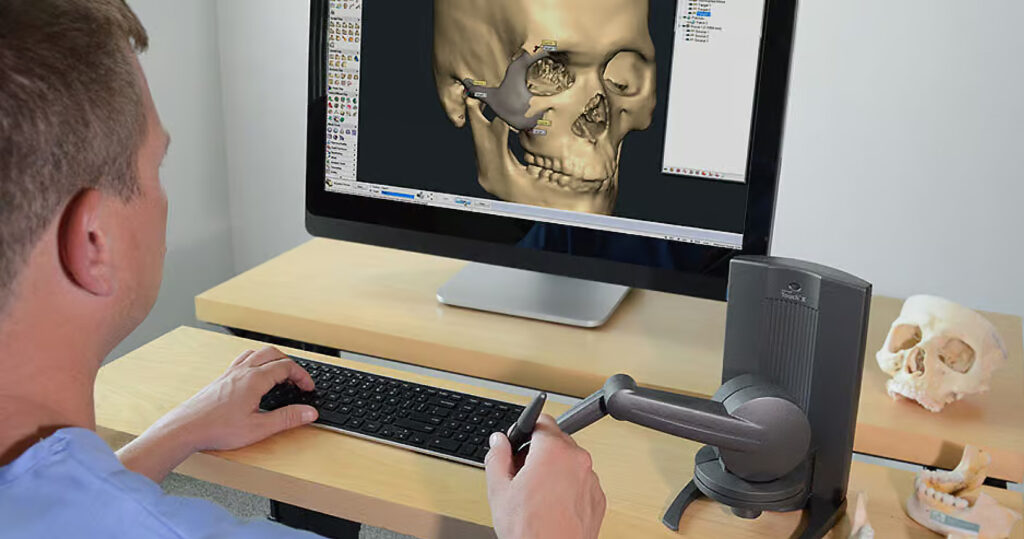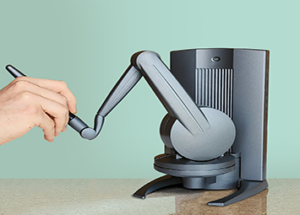
Enhancing Digital Design with the Power of Touch
Haptic Technologies
 Haptic technology refers to the use of touch feedback to interact with computer applications, bringing a tactile dimension to digital experiences. This technology is transforming how we interact with digital content by making these interactions more intuitive and immersive. This also significantly enhances the precision and realism of various workflows.
Haptic technology refers to the use of touch feedback to interact with computer applications, bringing a tactile dimension to digital experiences. This technology is transforming how we interact with digital content by making these interactions more intuitive and immersive. This also significantly enhances the precision and realism of various workflows.
In this blog post, we will explore the mechanics of haptic devices, their diverse applications in medical simulation, virtual prototyping, digital sculpting, and training, as well as their integration with advanced software like Freeform+. Additionally, we will highlight the role of OR3D, a platinum partner to Oqton, in providing haptic devices to the NHS, universities and artists.
The Mechanics of Haptic Devices
Haptic devices typically consist of a stylus or tool connected to a robotic arm. Using sophisticated force feedback mechanisms, these devices simulate the sensation of touch, allowing users to “feel” the virtual objects they are manipulating. This tactile feedback is crucial for tasks requiring fine motor skills and detailed manipulation, making it easier for medical professionals, designers, engineers, and artists to create complex shapes and surfaces.
 Applications of Haptic Devices
Applications of Haptic Devices
Medical Simulation
• Training Surgeons: Haptic devices enable surgeons to practice procedures in a virtual environment with realistic touch feedback. This improves their skills and reduces the risk associated with real surgeries.
Virtual Prototyping
• Design Iteration: Engineers and designers can manipulate virtual prototypes with haptic feedback, allowing for faster iteration and validation of designs before moving to physical production. This reduces costs and speeds up the development process.
Digital Sculpting and Modelling
• Artistic Precision: Artists and designers use haptic devices to sculpt and manipulate digital models with the same dexterity and sensitivity as traditional sculpting tools. This allows for the creation of intricate and organic shapes with ease.
Training and Education
• Hands-On Learning: Haptic devices are utilised in educational settings to teach a variety of subjects, from anatomy to assembly line techniques. By providing hands-on experience in a virtual environment, these devices enhance learning and skill acquisition.
Software Integration: Freeform+
Seamless Integration for Enhanced Precision
Freeform+ is designed to work seamlessly with haptic devices, offering a comprehensive suite of tools for creating and manipulating digital models. The software’s advanced algorithms and intuitive interface enhance the precision of the haptic feedback, making it easier for users to execute fine motor tasks and intricate designs with greater accuracy.
Advanced Digital Sculpting and Modelling
Freeform+ provides a robust set of features for digital sculpting and modelling, including tools for creating organic shapes, intricate details, and complex surfaces. When paired with haptic devices, users can leverage these features to manipulate digital models with the same dexterity and sensitivity as traditional sculpting tools. The ability to feel the virtual surfaces and textures as they work allows for more natural and intuitive design processes.
Improved Workflow and Efficiency
The combination of haptic devices and Freeform+ enhances the overall workflow, making it faster and more efficient. Users can quickly iterate on their models, receiving immediate tactile feedback on their adjustments. This real-time interaction reduces the time needed for trial and error, leading to quicker validation and refinement of designs before moving to physical production.
Haptic technologies are transforming the way we interact with digital environments. By adding the sense of touch to virtual experiences, these devices make digital design more intuitive, precise, and immersive. From medical simulations to virtual prototyping, digital sculpting, and educational training, the applications of haptic devices are vast and impactful.
NHS and Universities
OR3D is proud to support universities and the NHS across the UK, providing advanced haptic technologies and Freeform+ to enhance medical training and education. We offer demonstrations to showcase the capabilities of these technologies, ensuring that healthcare professionals and students experience realistic and immersive training environments.
For more information on Haptic Technologies and Freeform+ please visit Haptic Technologies or contact OR3D, platinum partner to Oqton on 01691 777 774.








